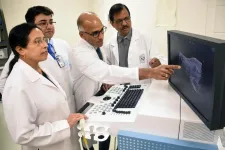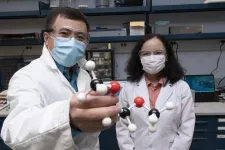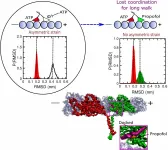Nanoparticle drug delivery technique shows promise for treating pancreatic cancer
Method may also work for breast, prostate, ovarian cancer
2021-01-28
(Press-News.org) Researchers with the Kansas City Veterans Affairs Medical Center and North Dakota State University have designed a new way to deliver pancreatic cancer drugs that could make fighting the disease much easier. Encapsulating cancer drugs in nanoparticles shows potential to target tumors more effectively and avoid danger to other parts of the body.
The study results appeared in the Jan. 4, 2021, issue of the journal Molecular Pharmaceutics.
Study author Dr. Sushanta Banerjee, a researcher with the Kansas City VA and University of Kansas medical centers, explains that this technology has the potential to drastically improve Veterans' cancer care. "Veteran health care will benefit immensely from such therapeutic models, as they are effective in delivering the drug to the tumor site without any toxic side effects [and with] minimal dosing. Once ready for patient use, this technique will reduce the number of doses required by a patient as well as effectively hinder the progression of the tumor."
Pancreatic ductal adenocarcinoma is the most aggressive form of pancreatic cancer. It is one of the leading causes of death from cancer worldwide. Patients with this form of cancer have a five-year survival rate of about 8%. Around 7% of all cancer deaths in the United States come from pancreatic ductal adenocarcinoma.
The medication gemcitabine is the current standard of care for treating this cancer. However, gemcitabine offers only a modest improvement to patients' chances of survival. Gemcitabine degrades quickly within the body, limiting its effectiveness. Pancreatic cancer tumors also often develop resistance to the drug.
A more effective treatment for this type of cancer, called an extracellular receptor kinase inhibitor (ERKi), has been developed. Genetic research has shown that a specific gene mutation is one of the main drivers of pancreatic tumor growth. The enzyme ERK interacts with this mutation, so inhibiting the enzyme can slow the cancer. Research also suggests that developed resistance to gemcitabine involves this enzyme.
Unfortunately, several problems make treating patients with ERKi difficult. The drug is toxic and can cause damage in other parts of the body. ERKi does not dissolved in water, making it difficult to prepare an effective formulation. It is also prone to breaking down in the body, limiting its effectiveness.
To combat these problems, the researchers created a new way to deliver medications to pancreatic tumors. They designed a nanoparticle delivery system to get both gemcitabine and ERKi to the pancreas where they will be most effective.
The two drugs are encased in nanoparticles made of polymers. The nanoparticles stop the drugs from breaking down and protect other areas of the body from the toxic effects.
The pH inside tumor cells is lower than the pH of the rest of the body. The nanoparticles are designed to release the drugs when they come in contact with a lower pH environment. In this way, the researchers can target the drugs specifically to cancer cells and not other areas of the body.
Using a nanoparticle vehicle to deliver the medications also allows for a higher dose to be given without needing multiple separate doses, says Banerjee.
In the study, the researchers tested their new technique on cancer cells cultured in the lab. The nanoparticle encapsulation effectively delivered the two drugs to the targeted cells. The testing showed that this drug combination can suppress cancer cell growth. Results also showed that this delivery method was "markedly" more effective than administering the drugs without the nanoparticles.
Additionally, the researchers found that adding ERKi to gemcitabine increased the body's sensitivity to gemcitabine. The two drugs work together synergistically to fight the cancer, according to the researchers.
While more research is needed, the study shows that the drug delivery method is a promising new way to fight pancreatic cancer.
According to Banerjee, this technique could also be used to treat other types of cancer, such as breast, prostate, and ovarian cancers. The nanoparticle polymers developed by the research team can be combined with different chemotherapy drugs to target tumors in different parts of the body, he explains.
The research team is currently working on different drug combinations to treat various cancers, and is also creating new polymers to improve cancer treatment.
INFORMATION:
The study was supported by VA, the National Institutes of Health (COBRE Center for Diagnostic and Therapeutic Strategies in Pancreatic Cancer at North Dakota State University), the National Science Foundation (Center for Sustainable Materials Science, North Dakota State University), the University of Kansas Medical Center Lied Basic Science Grant Program, and the Grace Hortense Greenley Trust.
[Attachments] See images for this press release:

ELSE PRESS RELEASES FROM THIS DATE:
2021-01-28
UPTON, NY--A team of researchers led by chemists at the U.S. Department of Energy's (DOE) Brookhaven National Laboratory has identified new details of the reaction mechanism that takes place in batteries with lithium metal anodes. The findings, published today in Nature Nanotechnology, are a major step towards developing smaller, lighter, and less expensive batteries for electric vehicles.
Recreating lithium metal anodes
Conventional lithium-ion batteries can be found in a variety of electronics, from smartphones to electric vehicles. While lithium-ion batteries have enabled the widespread use of many technologies, they still face challenges in powering electric vehicles over ...
2021-01-28
URBANA, Ill. - Getting nutrition right during a dairy cow's dry period can make a big difference to her health and the health of her calf. But it's also a key contributor to her milk yield after calving. New research from the University of Illinois shows diets containing consistent energy levels and the rumen-boosting supplement monensin may be ideal during the dry period.
"Many producers use a 'steam up' approach where you gradually increase the energy intake during the dry period to help adjust the rumen and adapt the cow to greater feed intakes after calving. Our work has shown that's really of questionable benefit for many farms, and it may be safer to just ...
2021-01-28
Global circulating winds can carry bacteria, fungal spores, viruses and pollen over long distances and across national borders, but the United States is ill-prepared to confront future disease outbreaks or food-supply threats caused by airborne organisms, says a new paper published in the Ecological Society of America's journal Ecological Applications.
Claire Williams, the paper's primary author and a research professor at American University, has spent decades studying long-range transport of tree pollen. Her early findings led to collaborations with German and Russian scientists who conducted a wide range of research - on forest genetics, atmospheric chemistry and ...
2021-01-28
Maybe space is tight in your home and you share a remote office with your spouse.
Or your partner asks you to step away from work to watch the children because they have an important call to jump on. Then you may wonder, 'Well, what makes his/her job more important than mine!'
There have been no shortage of conflicts arising from the era of COVID-19, and that includes the challenges at home between married couples.
In fact, the more a person felt that their spouse disrupted their daily routine, the more they viewed their relationship as turbulent, according to West Virginia University research.
Kevin Knoster, a third-year ...
2021-01-28
Washington and Chicago, January 28, 2021--The American Educational Research Association (AERA) and the Spencer Foundation have released a report, Voices from the Field: The Impact of COVID-19 on Early Career Scholars and Doctoral Students, that shares findings from focus groups conducted in spring 2020. The report, available on the AERA and Spencer websites, is part of an ongoing initiative by the two organizations to assess the pressing needs facing scholars and doctoral students during the pandemic and ways to address these needs.
"The realities of the COVID-19 pandemic and the ensuing impact on social institutions like school, work, and the family have created challenging ...
2021-01-28
Boulder, Colo., USA: Eleven new articles were published ahead of print for Geology in January 2021. The include new modeling, geochemical evidence of tropical cyclone impacts, transport of plastic in submarine canyons, and a porphyry copper belt along the southeast China coast. These Geology articles are online at http://geology.geoscienceworld.org/content/early/recent.
Episodic exhumation of the Appalachian orogen in the Catskill Mountains (New York State, USA)
Chilisa M. Shorten; Paul G. Fitzgerald
Abstract: Increasing evidence indicates the eastern North American passive margin has not remained tectonically quiescent since ...
2021-01-28
After analyzing the genomes of more than one-quarter of a million military veterans, a team of scientists, led by researchers at University of California San Diego, Veterans Affairs San Diego Healthcare System (VASDHS), Yale University and West Haven VA, have identified 18 specific, fixed positions on chromosomes (known as loci) that appear associated with post-traumatic stress disorder (PTSD).
The findings validate the underlying biology of PTSD, its relationship to comorbid anxiety and depressive disorders and provide potential new targets for treatment, write the authors in the January 28, 2021 online issue of Nature Genetics.
"We're very intrigued by the findings of this study, for example, as they pertain to the genetic relationships between different kinds of PTSD symptoms," ...
2021-01-28
3D-printable resins, such as those used in dental applications, are marketed as biocompatible
Clear tooth aligners, a multi-billion-dollar industry, use these resins
Many other consumer products use 3D-printable resins
CHICAGO --- Two commercially available 3D-printable resins, which are marketed as being biocompatible for use in dental applications, readily leach compounds into their surroundings. These compounds can induce severe toxicity in the oocyte, the immature precursor of the egg which can eventually be fertilized, reports a new Northwestern Medicine study in ...
2021-01-28
HOUSTON - (Jan. 28, 2021) - Like a wrench that gums up the gears, a common anesthetic keeps the motor proteins in your cells from making their rounds.
This is not necessarily a bad thing, but how it works has been a mystery until now.
Researchers at Rice's Center for Theoretical Biological Physics (CTBP) detail the mechanism that allows propofol -- the general anesthetic injected to knock you out before surgery -- to halt the movement of kinesin proteins that deliver cargoes along microtubules to the far reaches of cells.
The drug's effect on kinesin was known, ...
2021-01-28
WACO, Texas (Jan. 28, 2021) - An organization that projects an ethical face but whose managers fail to respond to internal ethical situations sends mixed messages to its employees, which can lead to a lack of employees' moral courage and an increase in unethical behavior, according to a study led by a Baylor University researcher.
The study, "Management Without Morals: Construct Development and Initial Testing of Amoral Management," is published in the journal Human Relations. The research comprises three survey-based studies of 1,034 full- and part-time workers to answer the question of, "What happens when leaders do not respond to the ethical components of business situations?".
"I ...
LAST 30 PRESS RELEASES:
[Press-News.org] Nanoparticle drug delivery technique shows promise for treating pancreatic cancer
Method may also work for breast, prostate, ovarian cancer





